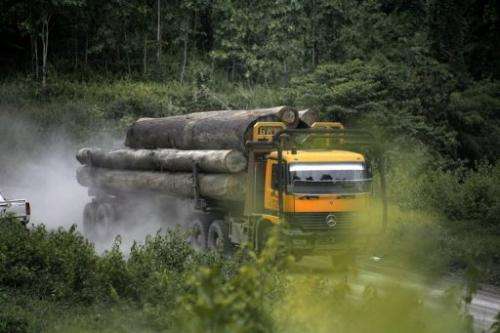A truck carries away timber in the upper Baram region of Malaysia's eastern Sarawak state on July 22, 2010. The European Union is cracking down on the timber trade in an effort to curb illegal logging, blamed for a host of ills from social upheaval to environmental and economic damage.
The European Union is cracking down on the timber trade in an effort to curb illegal logging, blamed for a host of ills from social upheaval to environmental and economic damage.
The European Commission, the EU's executive arm, said Friday that new rules effective from Sunday would affect everyone in the trade by barring illegally harvested timber from its huge internal market of some 500 million people.
"Illegal logging has severe economic, environmental and social impacts: it is associated with deforestation and climate change, it can undermine the efforts and livelihoods of legitimate operators, and it can also contribute to conflicts over land and resources," it said in a statement.
The new regime covers both imported and domestically produced timber and timber products—from paper and pulp to solid wood and flooring.
When timber first comes to market, the owner must apply "due diligence" to ensure the wood is legally sourced.
Traders who buy or sell timber already on the market are required to keep adequate records so it can be traced back to check the country of origin, supplier and compliance with national rules.
The commission said the new regulations would back up US and Australian efforts and complement bilateral accords with the world's six main timber producers—Cameroon, the Central African Republic, Congo (Brazzaville), Ghana, Liberia and Indonesia.
Global trade in primary timber products was worth more than 108 billion euros in 2011, of which 35 percent was accounted for by the EU, according to Commission figures.
(c) 2013 AFP



















